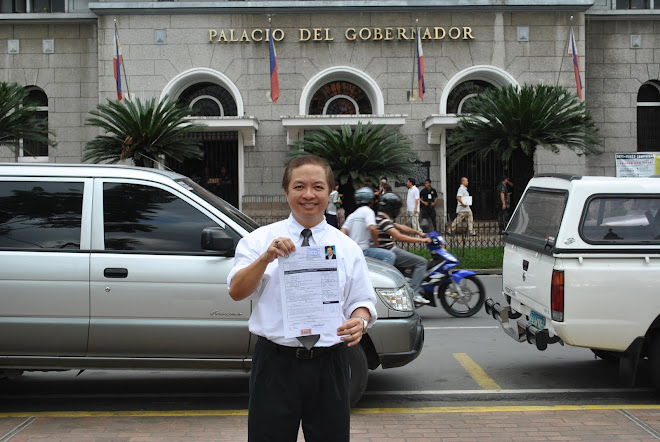Monday, September 29, 2008
Philippine among most corrupt countries - watchdog
Stamping out graft can save lives
By Thea Alberto, INQUIRER.net, Agence France-Presse
MANILA, Philippines -- The Philippines has been listed as being among the most corrupt countries in the world, according to the anti-corruption watchdog Transparency International (TI).
In its latest Corruption Perceptions Index, with zero being the most corrupt and 10 as being the cleanest, the Philippines had a score of 2.3, and was ranked 141st out of 180 countries surveyed. The poll was based on perceptions of business people and country analysts, the watchdog said. Somalia, the east African nation without a functioning government since 1991, is considered the most corrupt country with an index score of 1.0, followed by Myanmar (1.3); Iraq (1.3); Haiti (1.4); and Afghanistan (1.5).
Meanwhile, Denmark, Sweden, and New Zealand had a score of 9.3, followed by Singapore with 9.2. The score is based on perceptions of the degree of corruption as seen by business people and country analysts. TI said stopping practices such as cronyism and embezzlement can save lives in poor countries. "In the poorest countries, corruption levels can mean the difference between life and death, when money for hospitals or clean water is in play," TI said.
"The continuing high levels of corruption and poverty plaguing many of the world's societies amount to an ongoing humanitarian disaster and cannot be tolerated," the non-governmental organization's head Huguette Labelle said.
Rampant corruption in low-income countries also jeopardizes the global fight against poverty and threatens to derail the UN Millennium Development Goals (MDGs), the report published in Berlin said. This "calls for a more focused and coordinated approach by the global donor community to ensure development assistance is designed to strengthen institutions of governance and oversight in recipient countries, and that aid flows themselves are fortified against abuse and graft," TI said.
It estimates that unchecked levels of corruption would add $50 billion -- or nearly half of annual global aid outlays -- to the cost of achieving the MDGs on water and sanitation. The African Union has estimated that corruption costs the continent $148 billion annually, equal to the gross domestic product of Kenya, Tanzania and Cameroon combined, TI said. TI was also critical of some wealthy nations that registered significant drops in the global rankings, such as Britain, whose score fell to 7.7 points from 8.4 in 2007, and Norway, which dropped to 7.9 points from 8.7. Britain fell to 16th in the rankings from 12th in 2007, and Norway slipped to 14th from ninth.
The continuing emergence of foreign bribery scandals indicates a broader failure by the world's wealthiest countries to live up to the promise of mutual accountability in the fight against corruption, TI said. "This sort of double standard is unacceptable and disregards international legal standards," said Labelle.
"Beyond its corrosive effects on the rule of law and public confidence, this lack of resolution undermines the credibility of the wealthiest nations in calling for greater action to fight corruption by low-income countries."
Substantial improvements in the rankings were recorded for Albania, Cyprus, Georgia, Mauritius, Nigeria, Oman, Qatar, South Korea, Tonga and Turkey. The United States saw its score inch up to 7.3 points from 7.2 points in 2007, putting it at joint 18th place with Japan, whose score fell from 7.5 a year ago. China was on 3.6 points at 72nd, up from 3.5 points and just ahead of India, whose score dropped to 3.4 from 3.5 to put it in 85th position. Russia, in 147th place, also saw its score fall, from 2.3 points to 2.1 points. Germany's rose to 7.9 to 7.8, putting it in 14th position, while France's dropped to 6.9 from 7.3, making it 23rd.
By Thea Alberto, INQUIRER.net, Agence France-Presse
MANILA, Philippines -- The Philippines has been listed as being among the most corrupt countries in the world, according to the anti-corruption watchdog Transparency International (TI).
In its latest Corruption Perceptions Index, with zero being the most corrupt and 10 as being the cleanest, the Philippines had a score of 2.3, and was ranked 141st out of 180 countries surveyed. The poll was based on perceptions of business people and country analysts, the watchdog said. Somalia, the east African nation without a functioning government since 1991, is considered the most corrupt country with an index score of 1.0, followed by Myanmar (1.3); Iraq (1.3); Haiti (1.4); and Afghanistan (1.5).
Meanwhile, Denmark, Sweden, and New Zealand had a score of 9.3, followed by Singapore with 9.2. The score is based on perceptions of the degree of corruption as seen by business people and country analysts. TI said stopping practices such as cronyism and embezzlement can save lives in poor countries. "In the poorest countries, corruption levels can mean the difference between life and death, when money for hospitals or clean water is in play," TI said.
"The continuing high levels of corruption and poverty plaguing many of the world's societies amount to an ongoing humanitarian disaster and cannot be tolerated," the non-governmental organization's head Huguette Labelle said.
Rampant corruption in low-income countries also jeopardizes the global fight against poverty and threatens to derail the UN Millennium Development Goals (MDGs), the report published in Berlin said. This "calls for a more focused and coordinated approach by the global donor community to ensure development assistance is designed to strengthen institutions of governance and oversight in recipient countries, and that aid flows themselves are fortified against abuse and graft," TI said.
It estimates that unchecked levels of corruption would add $50 billion -- or nearly half of annual global aid outlays -- to the cost of achieving the MDGs on water and sanitation. The African Union has estimated that corruption costs the continent $148 billion annually, equal to the gross domestic product of Kenya, Tanzania and Cameroon combined, TI said. TI was also critical of some wealthy nations that registered significant drops in the global rankings, such as Britain, whose score fell to 7.7 points from 8.4 in 2007, and Norway, which dropped to 7.9 points from 8.7. Britain fell to 16th in the rankings from 12th in 2007, and Norway slipped to 14th from ninth.
The continuing emergence of foreign bribery scandals indicates a broader failure by the world's wealthiest countries to live up to the promise of mutual accountability in the fight against corruption, TI said. "This sort of double standard is unacceptable and disregards international legal standards," said Labelle.
"Beyond its corrosive effects on the rule of law and public confidence, this lack of resolution undermines the credibility of the wealthiest nations in calling for greater action to fight corruption by low-income countries."
Substantial improvements in the rankings were recorded for Albania, Cyprus, Georgia, Mauritius, Nigeria, Oman, Qatar, South Korea, Tonga and Turkey. The United States saw its score inch up to 7.3 points from 7.2 points in 2007, putting it at joint 18th place with Japan, whose score fell from 7.5 a year ago. China was on 3.6 points at 72nd, up from 3.5 points and just ahead of India, whose score dropped to 3.4 from 3.5 to put it in 85th position. Russia, in 147th place, also saw its score fall, from 2.3 points to 2.1 points. Germany's rose to 7.9 to 7.8, putting it in 14th position, while France's dropped to 6.9 from 7.3, making it 23rd.
Subscribe to:
Post Comments (Atom)










No comments:
Post a Comment